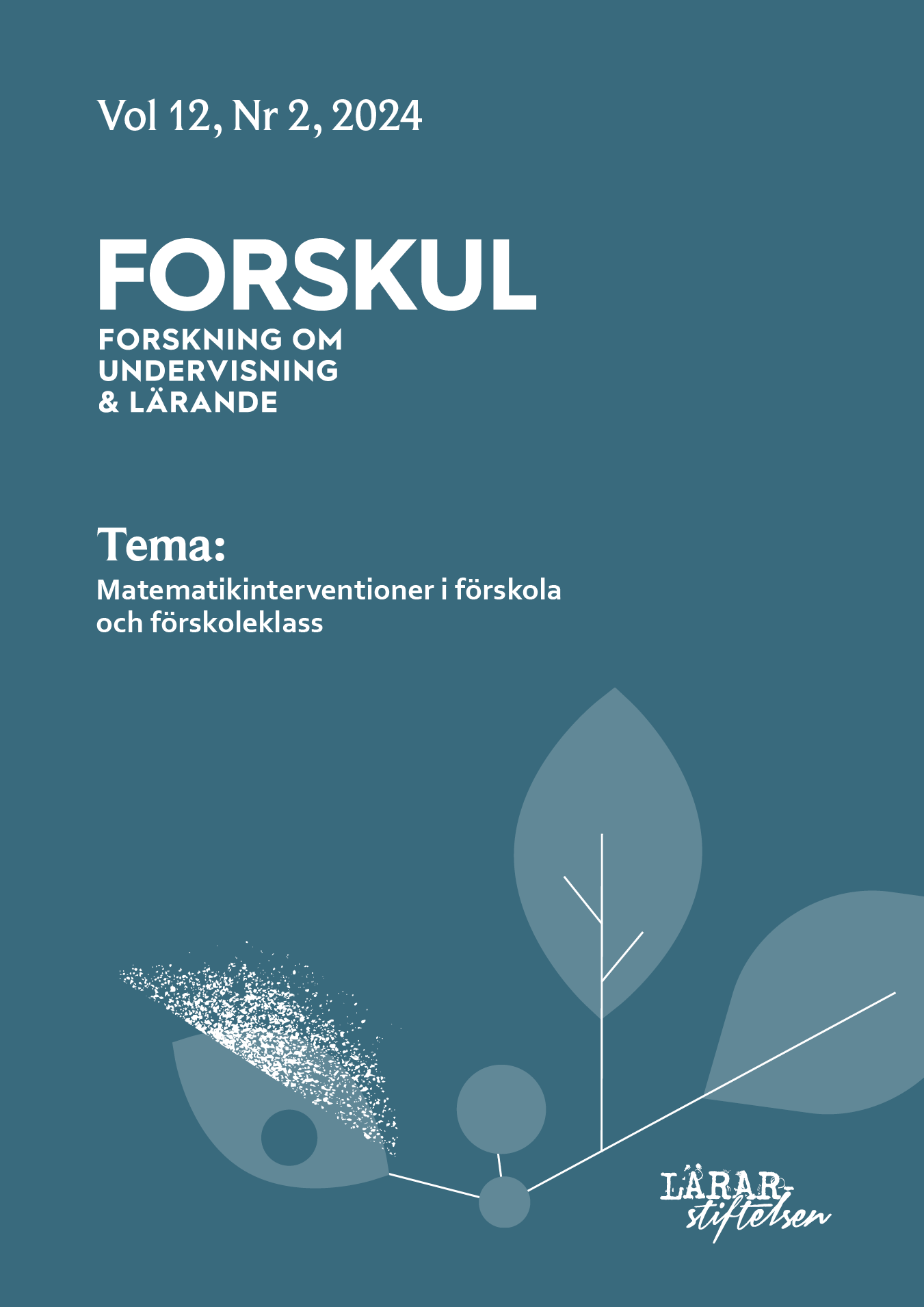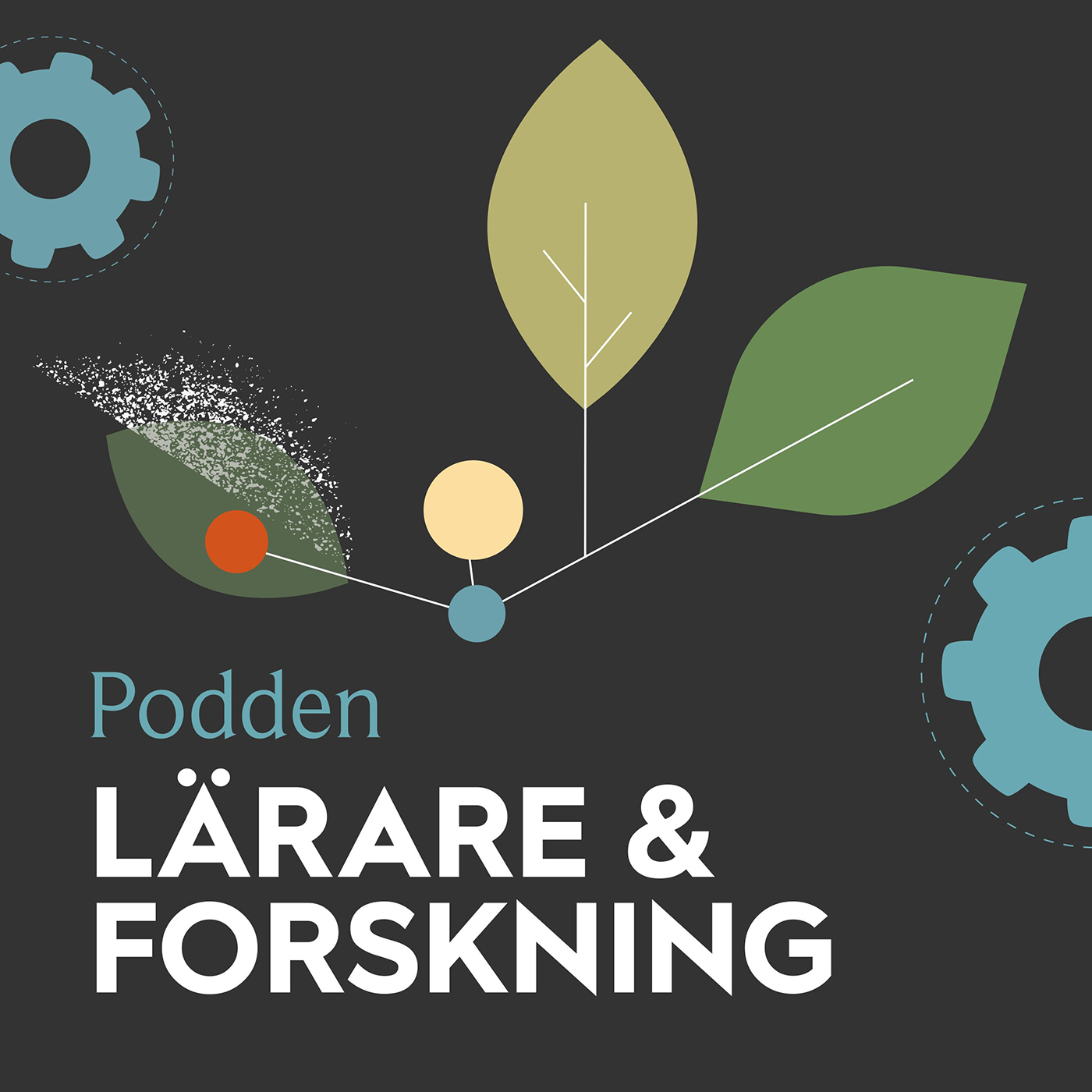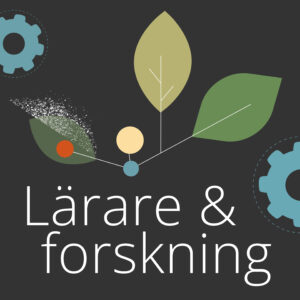Matematiska och etiska resonemang i förskolan – didaktisk modellering som intervention
DOI:
https://doi.org/10.61998/forskul.v12i2.23608Nyckelord:
didaktisk modeller, etiska resonemang, förskola, matematiska resonemangAbstract
I artikeln undersöks didaktiska val i undervisning där matematik och hållbar utveckling möts. Undervisningens syfte var att uppmuntra förskolebarn att kollektivt resonera kring fördelningsproblem. Det var barnens resonemang om möjliga lösningar som låg i fokus, inte ett rätt svar. Förskollärarens roll var att skapa möjligheter för agens: att barnen kunde göra egna bidrag i kunskapandet, där barnen kunde ställa olika konflikterande perspektiv om hållbara lösningar mot varandra och diskutera lösningarna. Utifrån metoden didaktisk modellering förde forskare och förskolläre diskussioner om undervisningen utifrån olika expertis. Dokumentationen som skapades under dessa möten analyserades, för att pröva om en didaktisk modell som hanterar de didaktisk vad- och hur-frågorna kunde hjälpa förskollärarna att skapa agens i undervisningen. Resultatet visar hur reflektion kring de didaktiska frågorna kan skapa möjligheter för agens i undervisningen. Didaktiska lösningar handlade om organisation av tid och miljö, om svårigheter att para ihop barn för kollektivt arbete samt språkutvecklande arbete.
Mathematical and ethical reasoning in preschool – didactic modeling as an intervention
The article examines didactic choices in teaching where mathematics and sustainable development meet. The purpose of the teaching was to encourage preschool children to reason collectively about distribution problems. It was the children's reasoning about possible solutions that was in focus, not a correct answer. The preschool teacher's role was to create opportunities for agency: enable childrens own contributions to knowledge, pit different conflicting perspectives on sustainable solutions against each other and discuss the solutions. Based on the didactic modeling method, researchers and preschool teachers discussed the teaching based on different expertise. Documentation created during these meetings was analysed, in order to investigate if the didactic what and how questions could help the preschool teachers create agency in teaching. The result shows how reflection on the didactic issues created opportunities for agency in relation to organization of time and environment, of pairing children for collective work and language development work.
Referenser
Andersson, K. (2017). Starting the pluralistic tradition of teaching? Effects of education for sustainable development (ESD) on pre-service teachers’ views on teaching about sustainable development. Environmental Education Research ,23(3), 436–449. https://doi.org/10.1080/13504622.2016.1174982
Bascopé, M., Perasso, P. & Reiss, K. (2019). Systematic review of education for sustainable development at an early stage: Cornerstones and pedagogical approaches for teacher professional development. Sustainability, 11(3), 719. https://doi.org/10.3390/su11030719
Bauman Z. (2013). Learning to walk on quicksand. I P. Mayo (Red.), Learning with adults. International issues in adult education (s. 9–18). SensePublishers.
Berglund, T. & Gericke, N. (2015). Separated and integrated perspectives on environmental, economic, and social dimensions – an investigation of student views on sustainable development. Environmental Education Research, 22(8), 1115–1138. https://doi.org/10.1080/13504622.2015.1063589
Biesta, G. (2012). Becoming world-wise: An educational perspective on rhetorical curriculum, Journal of Curriculum Studies, 44, 815–826. https://doi.org/10.1080/00220272.2012.730285
Block, T., Goeminne, G. & Van Poeck, K. (2018). Balancing the urgency and wickedness of sustainability challenges: Three maxims for post-normal education. Environmental Education Research, 24(9), 1424–1439. https://doi.org/10.1080/13504622.2018.1509302
Braun, V. & Clarke, V. (2006). Using thematic analysis in psychology. Qualitative Research in Psychology, 3, 77–101. https://doi.org/10.1191/1478088706qp063oa
Caiman, C. & Lundegård, I. (2014). Pre-school children’s agency in learning for sustainable development. Environmental Education Research, 20(4), 437–459. https://doi.org/10.1080/13504622.2013.812722
Cobb, P. & Bowers, J. S. (1999). Cognitive and situated learning perspectives in theory and practice. Educational Researcher, 28(2), 4–15. https://doi.org/10.3102/0013189X028002004
Codex. Regler och riktlinjer för forskning. (u.å.). [elektronisk resurs]
Dillenbourg, P. (1999). Introduction: What do you mean by 'collaborative learning'? I P. Dillenbourg (Red.), Collaborative learning: cognitive and computational approaches. Advances in learning and instruction series (s. 1–19). Elsevier Science Inc.
Eriksson, H., Hedefalk, M. & Sumpter, L. (2023). The tension between division and fair share. I H. Palmér, C. Björklund, E. Reikerås & J. Elofsson (Red.), Teaching mathematics as to be meaningful – foregrounding play and children’s perspectives: results from the POEM5 conference, 2022 (s. 69–79). Springer.
Ernest, P. (2020). Mathematics, ethics and purism: an application of MacIntyre’s virtue theory. Synthese, 199(1–2), 3137–3167. https://doi.org/10.1007/s11229-020-02928-1
Förenta Nationerna. (22 december 2022). Sustainable development goals, 4. Quality education goal, target 7. https://www.un.org/sustainabledevelopment/education/
Griffiths, M. & Murray, R. (2017). Love and social justice in learning for sustainability. Ethics and Education, 12(1), 39–50. https://doi.org/10.1080/17449642.2016.1272177
Haier, K., Siller, H. S. & Vorhölter, K. (2022). Criteria for sociocritical modeling tasks in sustainable development contexts. [Konferensbidrag] Twelfth congress of the European society of research in Mathematics Education (CERME12)., Bozen-Bolzano, Italy. hal-03745376
Hamza, K. & Lundqvist, E. (2023). Mangling didactic models for use in didactic analysis of classroom interaction. I F. Ligozat, K. Klette & J. Almqvist (Red.), Didactics in a changing world: European perspectives on teaching, learning and the curriculum (s. 103–121). Springer International Publishing. https://doi.org/10.1007/978-3-031-20810-2_7
Hedefalk, M., Caiman, C. & Ottander, C. (2022). Deliberation och kritik i förskolans undervisning för hållbar utveckling – ”så att det bli snällt där i världen”. Forskning om undervisning och lärande, 10(2), 88–108. https://doi.org/10.61998/forskul.v10i2.19006
Hedefalk, M. (2014). Förskola för hållbar utveckling. Förutsättningar för barns utveckling av handlingskompetens för hållbar utveckling. [Doktorsavhandling, Uppsala universitet].
Hedefalk, M., Almqvist, J. & Lundqvist, E. (2015). Teaching in preschool. Nordic Studies in Education, 35, 20–36.
Hjälmeskog, K., Andersson, K., Gullberg, A. & Lagrell, K. (2020). Didaktik i förskolan. Gleerups.
Håkansson, M. & Östman, L. (2019). The political dimension in ESE: the construction of a political moment model for analyzing bodily anchored political emotions in teaching and learning of the political dimension. Environmental Education Research, 25(4), 585–600. https://doi.org/10.1080/13504622.2017.1422113
Höglund, A. T. (2020). What shall we eat? An ethical framework for well‑grounded food choices. Journal of agricultural and environmental ethics, 33, 283–297. https://doi.org/10.1007/s10806-020-09821-4
Lithner, J. (2008). A research framework for creative and imitative reasoning. Educational Studies in Mathematics, 67(3), 255–276. https://doi.org/10.1007/s10649-007-9104-2
Lundegård, I. & Wickman, P. O. (2012). It takes two to tango: studying how students constitute political subjects in discourses on sustainable development. Environmental Education Research, 18(2), 153–169. https://doi.org/10.1080/13504622.2011.590895
Löf, C. & Vallberg Roth, A. C. (2021). Minding the gap: Dilemmas in a didactic and pragmatically informed teaching approach in preschool. Nordisk tidskrift för allmän didaktik, 7(1), 38–54. https://doi.org/10.57126/noad.v7i1.6595
Manson, J. (2020). Qualitative researching. SAGE.
Niss, M. (2003). Mathematical competencies and the learning of mathematics: The Danish KOM project. I 3rd Mediterranean conference on mathematical education (s. 115–124). The Hellenic Mathematical Society.
Rockström, J., Steffen, W., Noone, K., Persson, A., Chapin, F. S., Lambin, E. F., Lenton, T. M., Scheffer, M., Folke, C., Schellnhuber, H. J., Nykvist , B., de Wit, C. A., Hughes, T., van der Leeuw, S., Rodhe, H., Sörlin, S., Snyder, P. K., Costanza, R., Svedin, U., … Foley, J. A. (2009). A safe operating space for humanity. Nature, 461, 472–475. https://doi.org/10.1038/461472a
Rudsberg, K. & Öhman, J. (2010). Pluralism in practice – experiences from Swedish evaluation, school development and research. Environmental Education Research, 16(1), 95–111. Routledge. https://doi.org/10.1080/13504620903504073
Samuelsson, L. (2020). Etik i utbildning för hållbar utveckling–att undervisa den etiska dimensionen av en kontroversiell fråga. Acta Didactica Norden, 14(4), 1–22. https://doi.org/10.5617/adno.8348
Sheridan, S. & Williams, P. (Red.). (2018). Undervisning i förskolan: En kunskapsöversikt. Skolverket.
Sjöström, J. (2019). Didaktisk modellering. I K. Stolpe, G. Höst & A. Larsson (Red.), Forum för forskningsbaserad NT-undervisning. Bidrag från konferensen FobasNT18 13-14 mars 2018 i Norrköping (s. 121–132). Linköping University Electronic Press.
Skolverket. (2018). Läroplan för förskolan. [elektronisk resurs]
Skovsmose, O. & Borba, M. (2004). Research methodology and critical mathematical education. I P. Valero och R. Zevernberger (Red.), Researching the socio-political dimensions of mathematics education: Issues of power in theory and methodology (s. 207–226). Kluwer Academic Publisher.
Sumpter, L., Eriksson, H., Hedefalk, M. & Markkanen, P. (under utgivning). Grade 2 students’ conceptions about working with sharing. LUMAT: International Journal on Math, Science and Technology Education.
Sumpter, L. & Hedefalk, M. (2023). När dela lika är olika. Nordisk barnehageforskning, 20(2), 1–20. https://doi.org/10.23865/nbf.v20.256
Sumpter, L. & Hedefalk, M. (2018). Teachers’ roles in preschool children’s collective mathematical reasoning. European Journal of STEM Education, 3(3), 16. https://doi.org/10.20897/ejsteme/3876
Sumpter, L. (2016). Two frameworks for mathematical reasoning at preschool level. I T. Meaney, O. Helenius, M. L. Johansson, T. Lange & A. Wernberg (Red.), Mathematics education in the early years: Results from the POEM2 conference, 2014 (s. 157–169). Springer. https://doi.org/10.1007/9783319239354_9
Sporre, K., Lotz-Sisitka, H. & Osbeck, C. (2022). Taking the moral authorship of children and youth seriously in times of the Anthropocene. Ethics and education, 17(1), 101–116. https://doi.org/10.1080/17449642.2021.2024991
Tryggvason, Á, Öhman, J. & Van Poeck, K. (2023). Pluralistic environmental and sustainability education – a scholarly review, Environmental Education Research, Förhandspublicering online. https://doi.org/10.1080/13504622.2023.2229076
Vallberg Roth, A.-C., Holmberg, Y., Löf, C. & Stensson, C. (Red.). (2020). Didaktik – flerstämmig undervisning i förskolan. Studentlitteratur.
Van Poeck, K. & Östman, L. (2020). The risk and potentiality of engaging with sustainability problems in education—a pragmatist teaching approach. Journal of Philosophy of Education, 54(4), 1003–1018. https://doi.org/10.1111/1467-9752.12467
Wahlström, N. (2023). Läroplansteori och didaktik. Gleerups.
Wals, A. (2010). Between knowing what is right and knowing that is it wrong to tell others what is right: on relativism, uncertainty and democracy in environmental and sustainability education. Environmental Education Research, 16(1), 143–151. https://doi.org/10.1080/13504620903504099
Wickman, P.-O., Hamza, K. & Lundegård, I. (2018). Didaktik och didaktiska modeller för undervisning i naturvetenskapliga ämnen. NorDiNa, 14(3), 239–249. https://doi.org/10.5617/nordina.6148
Ärlemalm-Hagsér, E. & Sundberg, B. (2016). Naturmöten och källsortering – En kvantitativ studie om lärande för hållbar utveckling i förskolan. NorDiNa, 12(2), 140–156. https://doi.org/10.5617/nordina.1107
Publicerad
Referera så här
Nummer
Sektion
Kategorier
Licens
Copyright (c) 2024 Maria Hedefalk, Lovisa Sumpter, Helena Eriksson

Det här verket är licensierat under en Creative Commons Erkännande 4.0 Internationell-licens.
Författare till innehåll publicerat i Forskul behåller upphovsrätten till sina verk. Artiklar publiceras under villkoren i en Creative Commons-licens CC BY, som tillåter användning, nedladdning, distribution, länkning till och reproduktion i vilket medium som helst, förutsatt att originalverket är korrekt citerat.






